I would like to be clear that I do not advocate that Washingtonians acquire cannabis through unregulated channels, even though the horrid regulatory oversight of cannabis here is increasingly shifting the sweet spot of consumer value away from regulated access channels and toward unregulated ones. I would also like to be crystal clear that I do not advocate that Washingtonians acquire cannabis through regulated stores. Those who do are frequently not getting value for their dollar. Those who do are frequently getting ripped off.
Dr. James MacRae “Aug, 2023 – captured in a moment of funk”
According to recent data supplied by the Dept of Health (DOH), there are somewhere between 11,000 and 12,000 medical cannabis patients and/or designated providers currently holding recognition cards (i.e., they are in the DOH MMJ Patient database/registry). That is less than 5% of the number of medical cannabis patients that were generally thought to exist in the state when regulations were first being formulated.
According to the Liquor and Cannabis Board (LCB), 234 of the 473 licensed retail stores hold medical endorsements. While this represents slightly less than ½ of licensed stores, it is more than the 222 stores that the LCB created to implement the provisions of the Patient Protection Act back in 2016 when the state’s 1,800 – odd medical dispensaries were abolished and medical was rolled into the adult-use regulated system created under I-502. Having allowed the endorsement of more than 222 endorsed stores, the LCB can rest on its laurels and bask in it’s perception of yet another job well done.
Every week for years, the LCB has religiously updated their list of medically-endorsed stores — presumably so patients can better find stores able to meet their regulated needs. In addition to providing this information to patients, the LCB also provides links to the Dept. of Revenue (DOR) site (for some reason) and to the DOH site’s medical cannabis page.
On the DOH site, a list of the same 234 medically-endorsed stores is posted. The DOH has enhanced the utility of this list by adding an indicator that shows which of these stores have actually created a RECOGNITION card in the most recent calendar quarter (i.e., they have entered a patient and/or designated provided into the DOH Patient Registry and issued a card to the patient that ensures they are able to enjoy all of the privileges and benefits that go along with such status).
The DOH list shows that only 132 of those LCB-identified medical stores are currently active in a way that involves patient card creation. The fact that 44% of the LCB-identified medical stores appear to be not functioning in that capacity may explain why so many patients have expressed frustration in finding stores that can actually grant them cards. Most gave up on the LCB list years ago. The DOH addition of recent card-creation information is a relatively new addition (I only became aware of it this month) and is notable in that it is probably the first thing produced by the Department in over 5 years that is useful for patients. It is a step in the right direction.
If patients holding medical authorizations (“rxs”) from healthcare providers wish to get the full regulated benefits of patient status, they need to register in the DOH patient registry. That can only be done through participating stores.
I commend the DOH for adding some value to the essentially broken tool that the LCB has meticulously updated hundreds of times over the past few years.
I wanted to take the value added by the DOH a step further, as it’s clear the regulated channel is not one that is working well (if at all) for many consumers that use cannabis in their medicinal and/or nutritional regimes. While knowing that the LCB thinks 234 stores are “medical” adds some value to some patients, their list is full of false-positives. The DOH does a good job of narrowing it down to the 132 that have actually created at least one medical recognition card on behalf of a patient and/or designated provider during the most recent calendar quarter. If this list goes wrong, it’s more likely to miss a store that only creates recognition cards occasionally, but is fully capable of doing so. Some people may have seen things recently from the Cannabis Alliance that suggest that there are only 90 stores issuing cards. I discovered yesterday, just after posting this (and while at the Hempfest Memorial gathering in Myrtle Edwards Park) that the Alliance is using the DOH data, but is only counting stores that issued 10 or more cards in the most recent quarter in their total. I thought you should know, as it appears that we are all working from the same data, but I was worried when I saw the “90” number quoted in an invitation to an upcoming march in support of allowing homegrow.
Knowing that, I decided to extend the information beyond what the DOH reports and create a list that shows a wider swath of stores that are LIKELY to be currently able to serve patients properly as patients (e.g., create recognition cards and, presumably, all that goes along with that). I added in some sales data from each store to get an idea of the ratio of cards created to dollars of sales generated in order to get a very rough index of the CONCENTRATION of medical within that store’s customer base and/or the CONCENTRATION of medical within that store’s “approach towards doing business within the cannabis space”.
For those who care about the details, I created mean-standardized scores for the 12-month pretax sales dollar variable (where a score of 1.0 = the average sales across all recognition-card-creating stores statewide and 2.0 would be a store selling twice the average) and did the same for the Patients / Dollars Sold ratio metric.
I included all stores that had created at least one recognition card in the past 12 months. This is a bit more inclusive than the DOH filter (it includes 163 stores plus an additional 5 that I think may be tribally owned), but the downside is that it is more likely to include stores that are either no longer in business or that no longer create patient recognition cards.
To help with that, I included data on # of cards created, by quarter, across the past four quarters. Stores that have not created any cards for the past 3 quarters may have stopped doing so, for example.
The important variables are shaded in green. Stores with potential data issues (e.g., very low sales figures which might bias the patients-per-dollar sold ratio metric and/or stores where the LCB indicates that they are closed) are shaded yellow.
The two standardized metrics were weighted 25/75 (.25 sales, .75 patient/sales ratio) and stores were sorted (descending) within each county by the resulting weighted score.
The following tables each list all recognition-card-creating stores in one or more counties.
If I were advising a friend which store(s) to check out if they were engaged with the medicinality of cannabis, I’d point them to the stores within each county that have higher scores. It is my considered opinion that stores that bubble to the top of this list will, on average, have better product on hand and will have safer product on hand than will others. At least some of their staff are also likely to be more knowledgeable than average regarding cannabis as medicine and, perhaps, cannabis in general. Were I to be inclined to be a CORC (consumer of regulated cannabis), I would be inclined to differentially shop at these stores.
I hope you find this tool helpful in profiling stores if you are looking for what a medically-competent provider can offer.
After each table, I have added a little text re: my observations to help with use of and understanding of the table. If you have any questions or comments please leave them as comments on the post – I’ll try to respond with reasonable promptness.
I’m not likely to be updating this list going forward. I’d recommend that you use the DOH site I linked earlier where they offer an updated list of “ACTIVE medically-endorsed” stores periodically. It has been my experience that they tend to update their information quarterly — the most recent one being done with data through June.
Best of luck — and remember that, of the alternative intoxicating / mild-altering substances commonly available cannabis appears to be -by far- the safest. It is also the only one with wide-ranging medicinal value. It is the drug preferred by informed harm-reduction specialists world-wide.
Jay Inslee loves Washington cannabis — and the Governor can’t be wrong, can he?
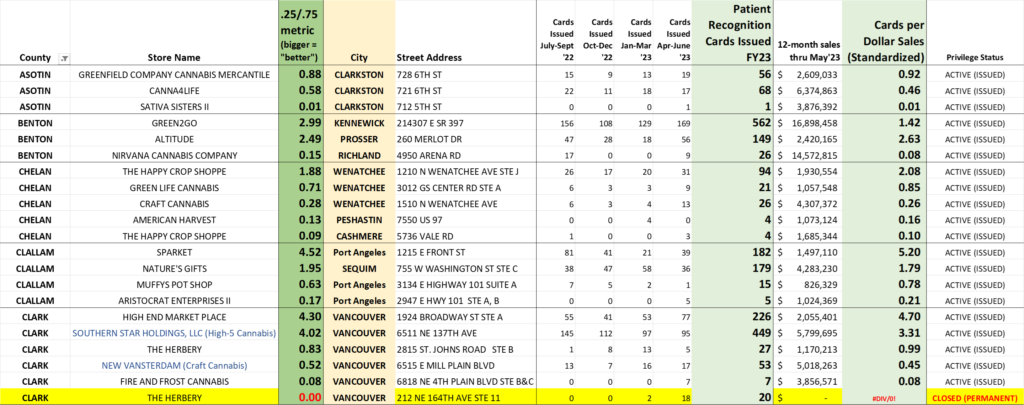
Just to orient you to this list – In Asotin County, your best bet (as a patient or person that believes medically-conscious stores might offer better and/or safer product and/or services) would be the first two of the three listed stores (although all three can, apparently, serve patients as patients). Note how the first store jumped ahead of the second one, in spite of the second one actually issuing more patient recognition cards. That is because they did more “cards per dollar sold”. On a percentage basis, “medical” means more to their business.
The Herbery, according to the LCB is closed. That is why I colored their row yellow. I’ve learned not to trust most of the LCB data as being “the truth” and felt that erring on the side of giving you, the consumer, more information was better than leaving them off the list.
The sales volume being done by the stores in Benton County is interesting. I am sure (really sure) that there is a good story there for whoever might want to look into it.

I spend more than a trivial amount of time in Jefferson County. Chimacum cannabis clearly differentiates itself from the pack (in a good way). I have never been in the store — and please, understand, I GET NO MONEY (or any other “reward”) from any licensees for doing this. I’m just sharing my opinion based on data and derived information that I think might be useful for folks.
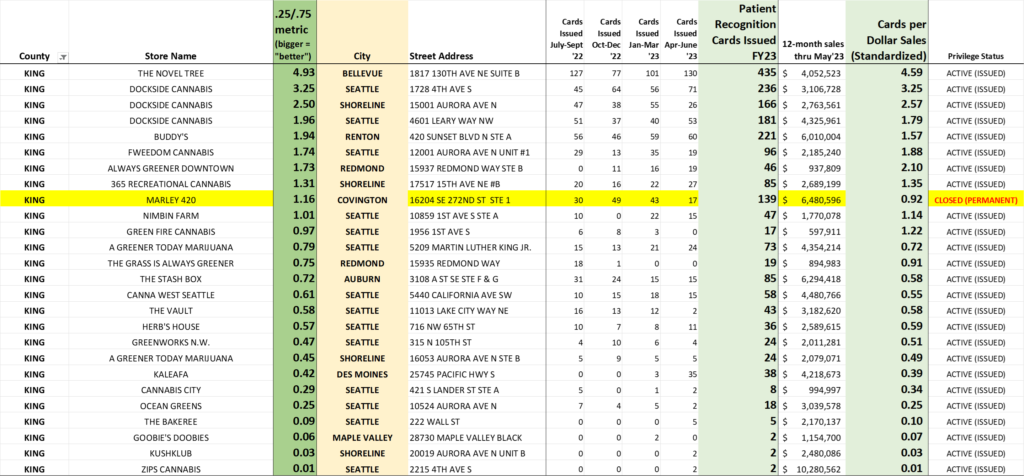
King County is the county I probably know the best, as it relates to cannabis. It was no surprise to me that Dockside is so well represented at the top of the list. They are one of three stores/chains that I recommend to friends and family in the area. They are, IMO, the best with respect to all things medical and doing things right. I also vouch for Canna West in West Seattle as being a good player with deep legacy medical roots … and it was nice to see Herb’s House (well – loved from the old days) on the list.
The Novel Tree in Bellevue is a (good) outlier on this list. Their numbers caught my interest. I intend to check them out.
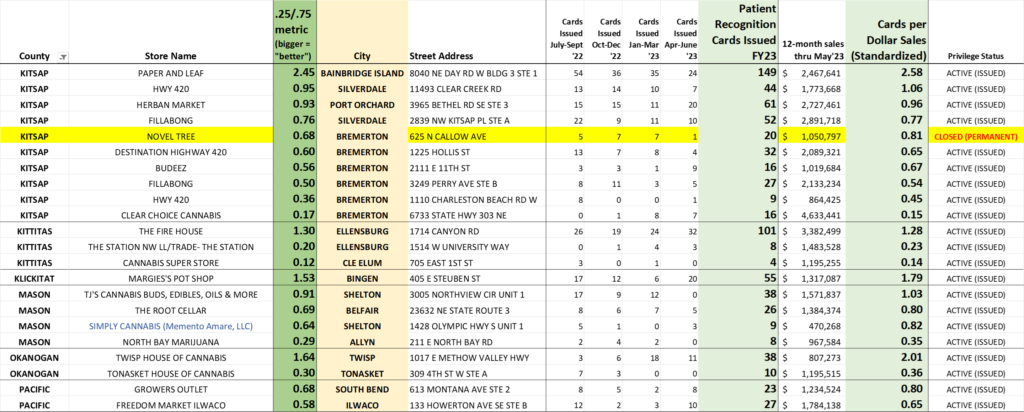
Paper and Leaf stands out from the crowd in Kitsap County (there — Leslie, you were correct!).
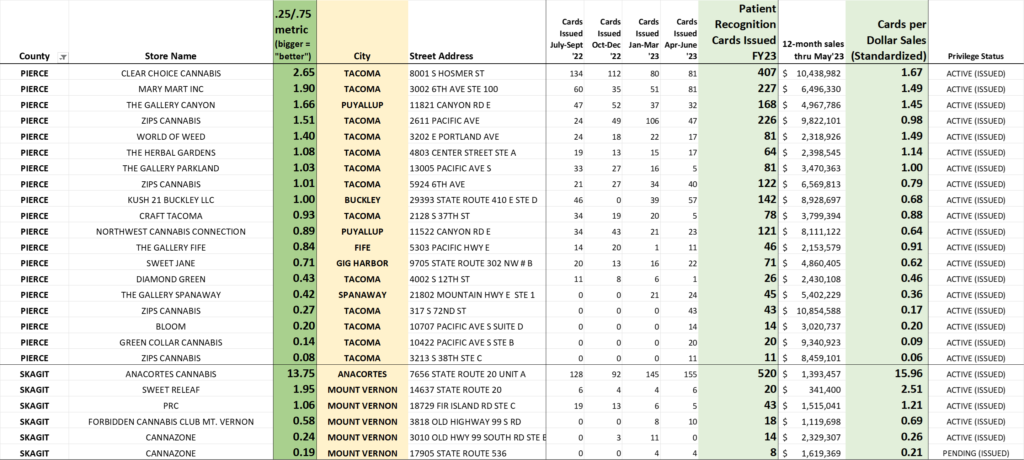
Anacortes Cannabis stands out amongst the Skagit County active medical access points.

I live in Snohomish County. I will be checking out White Rabbit Retail and a Greener Today (any of them, from the looks of it) in the future.
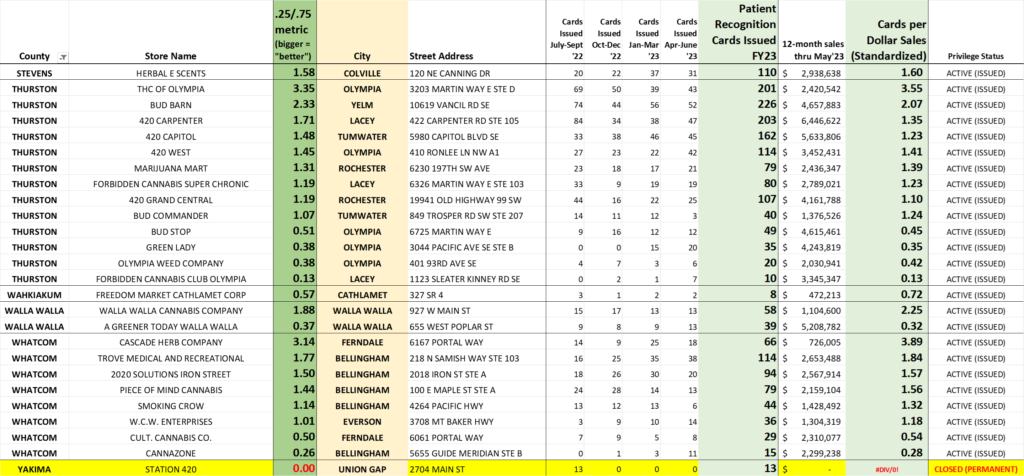
The 420 chain seems to have embraced medical broadly. The Cascade Herb Company up in Whatcom stands out.
In addition to these, while merging data between the DOH and LCB (not a great deal of fun, I’ll tell you), I believe I found 5 tribally-owned stores that are creating recognition cards. I could not tie these to sales data (the LCB tends to hide that for tribal businesses), so I left them off the tables above.
I’m not sure about these — but they ARE apparently creating recognition cards. In case they are helpful, here they are (in decreasing order of cards created in the past 4 quarters):
-Cedar Greens BLYN
-Greenfoot Cannabis OLYMPIA
-High Point Retail KINGSTON
-SQUAXIN MJ Tribal Compact – Native Sun Grown SHELTON
-Elwha Peaks Cannabis PORT ANGELES
All the best to you in trying to optimize the value you gain from Washington’s regulated medical (and/or adult-use) cannabis system. I sincerely hope this helps you source competent services and safe, appropriate medicinal products.
Nice to see stores that carry Washington Bud Company products on your list! Thank you, Jim, for your continued eye to the data.
That is not, at all, a surprise to me, Shawn. I expect stores that score higher to generally have higher-quality product on their shelves.
It is a shame that the LCB decided to break traceability. Back in the BioTrackTHC days, I’d be able to tell where your product was located.
It’s much tougher to do so now — as evidenced by how the LCB managed the product “recalls” surrounding Brewstergate.
One thing to remember about these lists — ALL of the stores on the list are “better” than the stores not on the list —- in terms of their engagement with the medical side of the regulated system.
I was surprised by some of the stores (and chains) that were missing from the list.
Thank you for your service, Jim; it’s a gift to have been able to read your mind as well as understand your methods, but it did not hurt my feelings to be told that I was right.
Bless you.
You are welcome (and right back at you, as well).
I was not surprised at how Paper & Leaf stood out from their peers in Kitsap county, given the confidence you expressed in your guess when I mentioned I was working on this.
I have learned to trust your judgement on such things. Good call.
Nicely done
Thank-you, Tom.
I sincerely hope that you find it useful.
Thank you for doing this analysis, Jim. I’ve been wondering about the ‘true’ state of the market with regard to medically endorsed stores.
Also, thank you for the shout out, we genuinely appreciate the acknowledgment. We put a lot of effort into serving medical patients properly. We have four certified consultants on staff and we prioritize quality and safety in curating our products. I’m so proud of our staff and their consistent work in expanding their knowledge and ability to guide our customers. Did you know we have had the same staff members (with the exception of one new addition) for AT LEAST two years, most even longer?! I’m so proud to work with people who genuinely care about what they are doing. The Covid years were not easy and so many adjustments were made and the changes were not always easy to work through, I have such a respect for our numerous team members who stayed the course and did the hard work of keeping our team and customers safe and well supplied.
Thanks for the work you do, hope you are well!
My pleasure. I always point folks in the direction of Canna West Seattle if they are looking for the best place to shop in that part of town.
Yours is one of the few shops that have (truly) embraced the concept of cannabis as medicine and has consistently operated with the well-being of the patient in mind.
It’s nice to occasionally have my theory that good people do good things supported by fact. Keep up the good work!